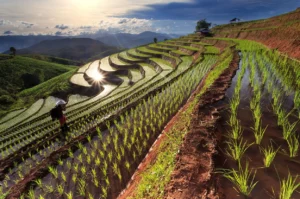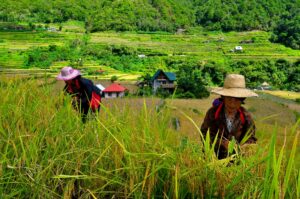by Jon Hellin, Eleanor Fisher, Mary Ng’endo, Ana María Loboguerrero, Nyang’ori Ohenjo, and Sabrina Rose
Indigenous Peoples have been portrayed as highly vulnerable to climate change while at the same time possessing skills and knowledge that are critical to the climate response. Indigenous Peoples’ participation in environmental governance is one of several key pathways through which they actively engage “with the management of and relationships to nature”. However, they have been underrepresented in reports fundamental to the emergence of climate-resilient food, land, and water systems. In recent years, there has been greater recognition of the importance of respecting indigenous rights in climate policy and ensuring Indigenous Peoples’ active participation in climate fora.
In 2015, the United Nations adopted the 2030 Agenda for Sustainable Development to end poverty in all its forms. Seventeen Sustainable Development Goals (SDGs) were underpinned by the pledge that “no one will be left behind”. The achievement of many SDGs is dependent on the fostering of climate-resilient food, land and water systems, and ensuring that sustainable development is equitable and inclusive.
This particularly applies to Indigenous Peoples who continue to be the poorest among the poor irrespective of the poverty line used. This raises the issue of climate justice and ensures that Indigenous Peoples’ right to full and effective participation in policy processes is upheld in climate change fora, especially the United Nations Framework Convention on Climate Change (UNFCCC).
PLOS Climate has published several opinion articles about Indigenous People’s active participation in climate change processes. We build on these by stressing the importance of a more granular approach to climate justice and Indigenous Peoples’ participation in climate policy processes.
We argue that a more explicit focus on and context-specific understanding of social equity allows for greater participation of the most vulnerable within Indigenous communities. This necessitates attention to historical and contemporary relations of power and oppression, ones that frame the lives of Indigenous Peoples worldwide.
By implication, it mitigates the dangers of maladaptation within these communities and gives greater credence to the pledge to leave no one behind. The importance of social equity highlights a key research development and evidence gap ahead of the 2024 Conference of the Parties (COP) of the UNFCCC (COP29).
Indigenous Peoples have been portrayed as highly vulnerable to climate change while at the same time possessing skills and knowledge that are critical to the climate response. Indigenous Peoples’ participation in environmental governance is one of several key pathways through which they actively engage “with the management of and relationships to nature”.
Indigenous Peoples’ contributions, however, have been underrepresented in previous reports by the Intergovernmental Panel on Climate Change (IPCC), Nationally Determined Contributions, and COPs. These processes are fundamental to the emergence of climate-resilient food, land, and water systems.
Despite this under-representation, there has, in recent years, been greater recognition of the importance of respecting Indigenous rights in climate policy and ensuring Indigenous Peoples’ active participation in climate fora.
For decades, Indigenous Peoples have collectively lobbied for greater and more genuine participation in climate policy processes. The Local Communities and Indigenous Peoples Platform (LCIPP), established under paragraph 135 of the Paris Agreement on Climate Change, aims to strengthen the knowledge, technologies, practices, and efforts of local communities and Indigenous Peoples related to addressing and responding to climate change.
Similarly, Indigenous organizations have also voiced concerns and influenced payment mechanisms for Reducing Emissions from Deforestation and Forest Degradation (REDD+).
Few would argue that Indigenous Peoples’ participation in climate policy processes has gone far enough. There remains a tendency to divorce climate change from its socio-political-historical-cultural context and depoliticize it by drawing attention away from the root causes of vulnerability, ones that can also determine inequities within Indigenous communities, including Indigenous women and youth, those with disabilities, as well as the elderly and children.
Much success hinges on fostering inter- and transdisciplinary relationships characterized by trust, accountability, reciprocity, and not least ‘intellectual humility’ on the part of scientists and decision-makers. Tackling the root causes of vulnerability and identifying fairer development pathways and ence, requires a more granular social equity approach that addresses unevenly distributed power relations, and existing networks of control and influence from local to global levels.
Enhancing Indigenous Peoples’ participation in climate policy processes in part rests on the premise of climate justice, tackling the root causes of complex inequalities and making political choices about the (re)distribution of benefits. Applying a social equity lens implies considering how power, rights, resources and opportunities are distributed; agreeing on principles of fair distribution; and, ensuring that distribution is consistent with these principles. A social equity lens highlights four different dimensions of equity.
Recognitional equity: embracing different identities, values, and rights. This includes the reduction of the vulnerability of minority groups within Indigenous communities, for example, women, youth, elders, children, and disabled people.
Representational equity: empowering Indigenous Peoples to shape agricultural strategy by having a meaningful and effective role in decision-making, including by women and other vulnerable groups.
Distributional equity: ensuring Indigenous Peoples have equitable access to the benefits of climate-resilient agriculture and that adaptation strategies do not expose vulnerable groups to greater risk or generate further unequal burdens from climate change.
Intergenerational equity: enabling Indigenous Peoples to secure the stewardship of land and natural resources for future generations.
Beyond issues of distribution, social equity makes explicit how important recognitional issues related to Indigenous identities, and representational issues related to roles in decision-making, are for climate justice. A more explicit focus on social equity and context specificity contributes to ensuring that Indigenous Peoples have a political voice and are amongst those who ‘count’ to realize participatory parity and secure their full participation in identifying and realizing climate-resilient transformation pathways.
Policymakers should establish mechanisms to meaningfully engage Indigenous Peoples in climate policy processes based on these four dimensions of social equity.
For example, the Ministry of Environment, Forestry, and Climate Change in Kenya hosted a workshop with Indigenous Peoples, particularly women and persons with disabilities, to inform the Third National Climate Change Action Plan. Such mechanisms must also be complemented with capacity building to strengthen Indigenous groups’ advocacy and negotiation skills in policy settings. This reduces the risk of superficial engagement and encourages equitable participation and outcomes.
This work was carried out with support from the CGIAR Initiative on Climate Resilience (ClimBeR).
Read the study:
Hellin J, Fisher E, Ng’endo M, Loboguerrero AM, Ohenjo N, Rose S (2024) Enhancing Indigenous Peoples’ participation in climate policy processes. PLOS Clim 3(4): e0000392.






